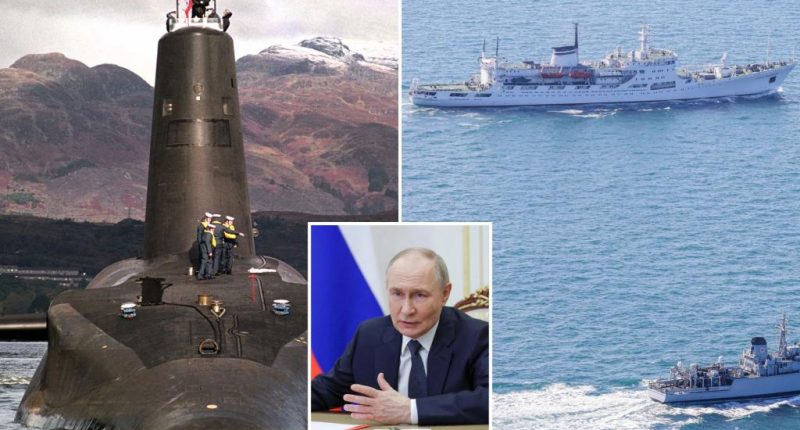
A new report revealed Russian spy sensors are tracking the United Kingdom’s nuclear submarines – with the alarming discovery kept hidden from the public despite British military officials deeming it a national security threat.
Now military operatives are in fear that the devices, some of which were found lurking in surrounding waterways by the Royal Navy, were planted by the Kremlin to monitor and potentially sabotage critical British infrastructure, including four Vanguard subs carrying nuclear missiles, The Sunday Times reported.
“There should be no doubt, there is a war raging in the Atlantic,” one senior military source told the outlet.
“This is a game of cat and mouse that has continued since the ending of the Cold War, and is now heating up again. We are seeing phenomenal amounts of Russian activity.”
Officials believe Russian President Vladimir Putin is conducting a secret mission as part of a wider “greyzone” warfare effort targeting cables, pipelines and undersea assets.
The military has discovered other covert sensors planted on the sea bed, spy gear washed up along the British shores, and unmanned Russian vehicles near deep-sea communications cables – 11 of which have been damaged in the Baltic Sea over the last 15 months, the outlet reported.
There are 60 internet cables that currently connect Britain to the rest of the world — some of which are not public, a senior source said.
The Ministry of Defence has also obtained intelligence suggesting superyachts owned by Russian oligarchs were deployed to conduct underwater probes.
“Our role is to both defeat any threats to the UK as well as take it out of the greyzone,” Captain Simon Pressdee said.
“We do the latter by understanding who is involved and providing that evidence to avoid misunderstandings who is involved and providing that evidence to avoid misunderstandings and make those who threaten the UK accountable for their actions.”
While the presence of Russian ships in UK waters is nothing new, the government is now trying to secure funding from technology and energy companies to help the military protect underwater infrastructure.
In the short-term, the military will deploy a project, codenamed Cabot, to get those resources up and running in partnership with private industries that rely on underwater infrastructures.
But Navy sources told the outlet the government should lay sea mines — an effort that hasn’t been imposed since the end of the Cold War.
“We are committed to enhancing the security of critical offshore infrastructure,” a spokesperson for the Ministry of Defence said.
“Alongside our NATO and Joint Expeditionary Force allies, we are strengthening our response to ensure that Russian ships and aircraft cannot operate in secrecy near the UK or near NATO territory, harnessing new technologies like AI and coordinating patrols with our allies. And our continuous-at-sea nuclear deterrent continues to patrol the world’s oceans undetected as it has done for 56 years.”








